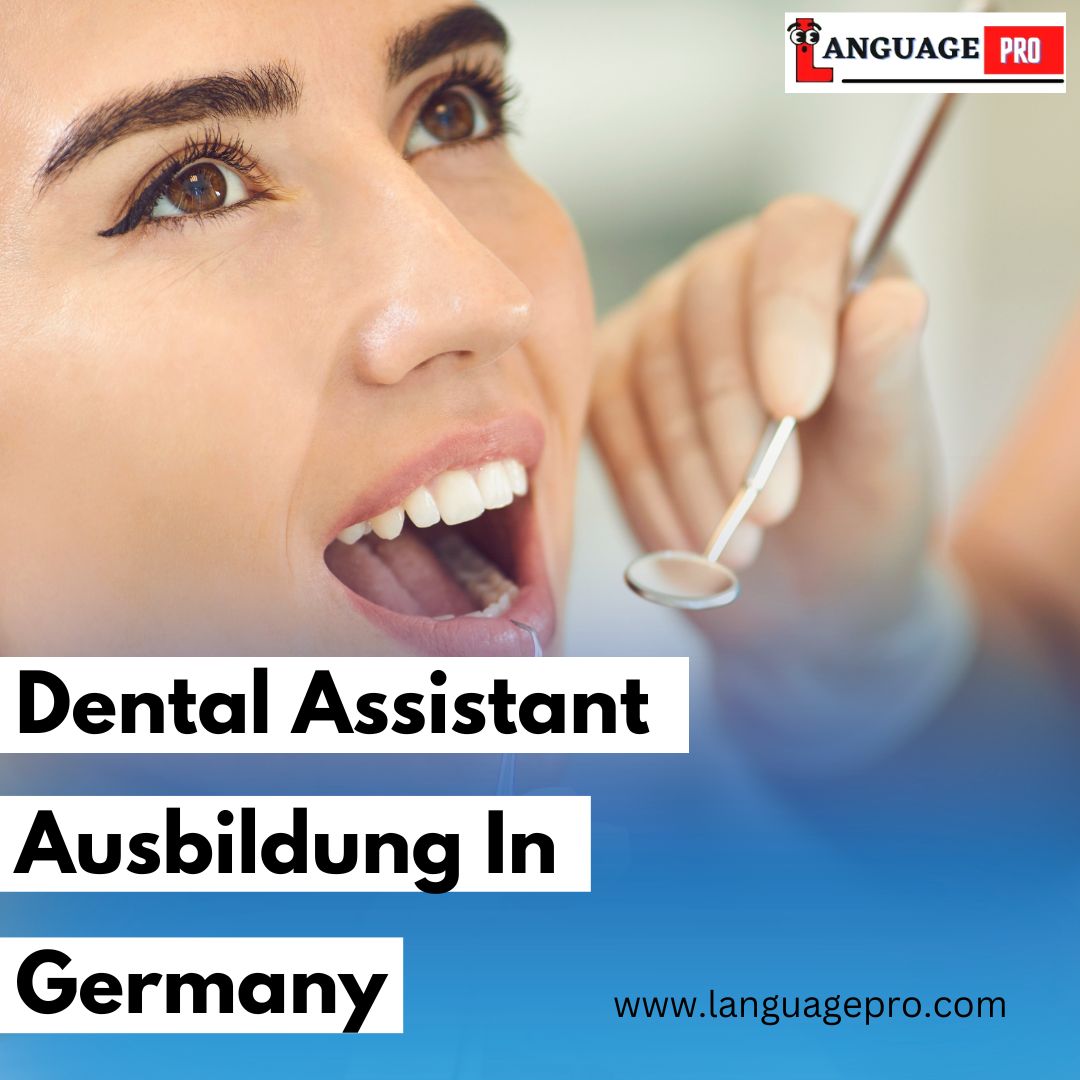Table of Contents
Dental Assistant Ausbildung in Germany
Introduction:
Are you passionate about dentistry and seeking a rewarding career in the healthcare industry? Germany, renowned for its advanced medical facilities and quality education, offers an excellent pathway through a Dental Assistant Ausbildung. In this comprehensive guide, we will explore the various aspects of pursuing a Dental Assistant Ausbildung in Germany, providing insights into the training process, career prospects, and the steps to kickstart your journey in this dynamic field.
1. Understanding Dental Assistant Ausbildung:
To embark on a successful career as a dental assistant in Germany, it’s crucial to comprehend the nature and significance of the Ausbildung program. This section will delve into the core components of the Dental Assistant Ausbildung, outlining the curriculum, duration, and the practical skills you’ll acquire during the training period.
The Dental Assistant Ausbildung program is designed to equip aspiring professionals with a solid foundation in dental sciences and practical skills. It typically spans a duration of [duration], encompassing both classroom instruction and hands-on clinical experience. The curriculum covers a wide range of subjects, including dental anatomy, radiography, infection control, and patient care. By the end of the program, trainees are well-prepared to assist dental practitioners in various procedures and ensure the smooth functioning of a dental practice.
2. Admission Requirements and Eligibility:
Aspiring dental assistants need to meet specific eligibility criteria to enroll in the Ausbildung program. This section will guide you through the admission requirements, academic prerequisites, and any additional qualifications that might enhance your chances of securing a spot in the program.
Admission to a Dental Assistant Ausbildung program in Germany typically requires a high school diploma or its equivalent. Additionally, candidates may need to demonstrate proficiency in the German language, as effective communication is paramount in healthcare settings. Some programs may have specific prerequisites, such as basic knowledge of biology or chemistry. Obtaining relevant certifications, such as CPR or first aid, can also strengthen your application.
3. The Ausbildung Process:
- Once accepted into the program, what can you expect during your Dental Assistant Ausbildung in Germany? This segment will provide a detailed overview of the training process, including theoretical coursework, hands-on clinical experience, and any specialized modules that might be part of the curriculum. A glimpse into a day in the life of a dental assistant trainee will help set realistic expectations for prospective students.
- The Dental Assistant Ausbildung is a holistic training experience that combines theoretical learning with practical application. Trainees attend lectures and workshops where they acquire in-depth knowledge of dental procedures, equipment usage, and patient care protocols. This theoretical foundation is complemented by clinical rotations, allowing students to work alongside experienced dental professionals and apply their knowledge in real-world scenarios.
- Throughout the Ausbildung, trainees develop a diverse skill set, including chairside assistance, sterilization techniques, and administrative tasks. The program’s structured approach ensures that graduates are not only well-versed in dental theory but also proficient in the day-to-day responsibilities of a dental assistant.
4. Key Skills and Competencies:
- Successful dental assistants possess a unique set of skills that go beyond the technical aspects of the job. This section will highlight the key skills and competencies developed during the Ausbildung, such as effective communication, attention to detail, and the ability to work in a team. Employers value these skills, making you a sought-after professional in the dental field.
- Communication skills are paramount for dental assistants, as they interact with both patients and dental practitioners on a daily basis. The Ausbildung emphasizes effective communication techniques, ensuring that trainees can convey information clearly, address patient concerns, and collaborate seamlessly with the dental team.
- Attention to detail is another critical aspect of a dental assistant’s role. From preparing treatment rooms to maintaining accurate patient records, precision is essential to ensure the smooth flow of dental procedures. The Ausbildung instills a keen eye for detail in trainees, fostering a commitment to maintaining the highest standards of quality and accuracy in their work.
- Collaboration and teamwork are integral to the functioning of a dental practice. Dental assistants work closely with dentists, dental hygienists, and administrative staff to provide comprehensive patient care. The Ausbildung includes collaborative learning opportunities, encouraging trainees to understand their role within the dental team and contribute effectively to the overall success of the practice.
5. Career Prospects and Opportunities:
- What awaits you after completing your Dental Assistant Ausbildung? Explore the diverse career prospects and opportunities available in Germany for qualified dental assistants. From working in private dental practices to employment in hospitals or research institutions, the possibilities are vast. This section will also touch upon potential career advancements and further specialization options.
- Graduates of a Dental Assistant Ausbildung program in Germany enter a dynamic job market with a range of career options. Some choose to work in general dental practices, where they assist dentists in routine procedures, educate patients on oral hygiene, and manage administrative tasks. Others may opt for specialized fields such as orthodontics, oral surgery, or pediatric dentistry, where their skills can be applied in more focused settings.
- Hospitals and dental clinics attached to healthcare institutions also provide opportunities for dental assistants to contribute to patient care. In these settings, dental assistants may be involved in assisting with oral surgeries, providing post-operative care, and collaborating with other healthcare professionals to address overall patient well-being.
- Beyond clinical roles, dental assistants can explore avenues in dental research, education, or sales and marketing of dental products. Some may choose to advance their careers by pursuing further education, such as becoming a dental hygienist or specializing in a specific area of dentistry. The versatility of skills gained during the Ausbildung opens doors to a variety of career paths, allowing dental assistants to tailor their professional journey according to their interests and aspirations.
6. Challenges and Solutions:
- Every journey has its challenges, and pursuing a Dental Assistant Ausbildung is no exception. This part of the article will address common hurdles faced by trainees and provide practical solutions and tips for overcoming them. Whether it’s time management, academic pressures, or balancing work and study, proactive measures can ensure a smoother transition through the program.
- Time management is often a challenge for dental assistant trainees, given the combination of classroom instruction, clinical rotations, and self-study requirements. To overcome this challenge, it’s essential to create a realistic schedule that allocates time for lectures, practical training, and personal study. Utilizing productivity tools and seeking guidance from mentors or senior dental assistants can help trainees optimize their time and achieve a balance between academic and practical aspects of the Ausbildung.
- Academic pressures may arise due to the intensive nature of the Dental Assistant Ausbildung. Trainees can mitigate this challenge by staying organized, breaking down study materials into manageable segments, and seeking support when needed. Forming study groups with fellow trainees can foster a collaborative learning environment, providing opportunities for mutual assistance and knowledge-sharing.
- Balancing work and study commitments is a common concern for those undergoing the Dental Assistant Ausbildung while working part-time or managing other responsibilities. Trainees can address this challenge by prioritizing tasks, setting realistic goals, and communicating openly with employers and instructors. Establishing a support network, including classmates, family, and friends, can contribute to a positive and manageable Ausbildung experience.
7. Industry Insights and Trends
Stay ahead of the curve by understanding the latest trends and innovations in the dental industry. This section will explore technological advancements, emerging practices, and how staying informed can contribute to your success as a dental assistant
Conclusion:
Embarking on a Dental Assistant Ausbildung in Germany opens doors to a rewarding healthcare career. This guide has equipped you with insights for success, emphasizing dedication and continuous learning.
As you advance, consider enhancing your linguistic skills with LanguagePro. Tailored language courses await, providing an avenue to broaden your professional horizons. Whether mastering German or exploring new languages, LanguagePro is your key to unlocking broader opportunities.
Your journey as a dental assistant extends beyond procedures; it’s about contributing to oral health and community well-being. Seize the future with enthusiasm and explore LanguagePro to elevate your language proficiency, opening doors to global possibilities as you make a positive impact in the dynamic realm of dental healthcare in Germany.
FAQ’s
1. What are the prerequisites for enrolling in a Dental Assistant Ausbildung program in Germany?**
Ans: Typically, applicants need a high school diploma, proficiency in German, and may require additional qualifications like basic knowledge of biology or chemistry.
2. What is the duration and structure of a Dental Assistant Ausbildung in Germany?
Ans: The program duration varies but usually spans several years, combining classroom learning with hands-on clinical experience through rotations.
3. What career opportunities are available after completing a Dental Assistant Ausbildung?
Ans: Graduates can work in dental practices, hospitals, or research institutions, with options to specialize in areas like orthodontics or oral surgery.
4. How can dental assistant trainees overcome common challenges during the Ausbildung?
Ans: Strategies include effective time management, seeking support from mentors, and maintaining open communication with employers and instructors.
5. What certifications and licenses are required for practicing as a dental assistant in Germany post-Ausbildung?
Ans: Graduates typically need to obtain certifications and licenses by meeting specific requirements set by regulatory authorities. Staying informed about industry standards is essential.




